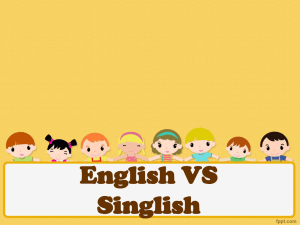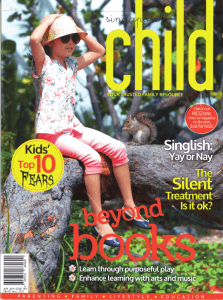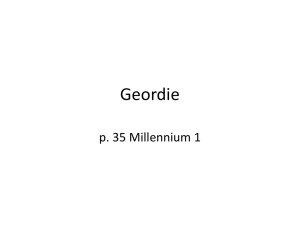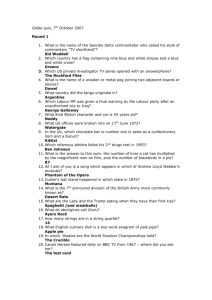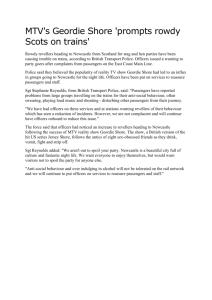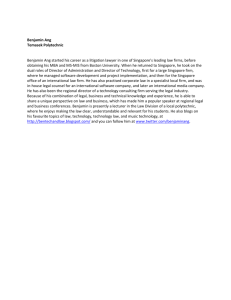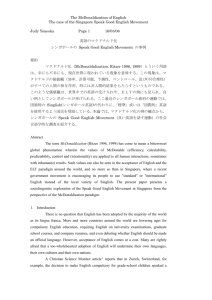Singlish on the Web.
advertisement
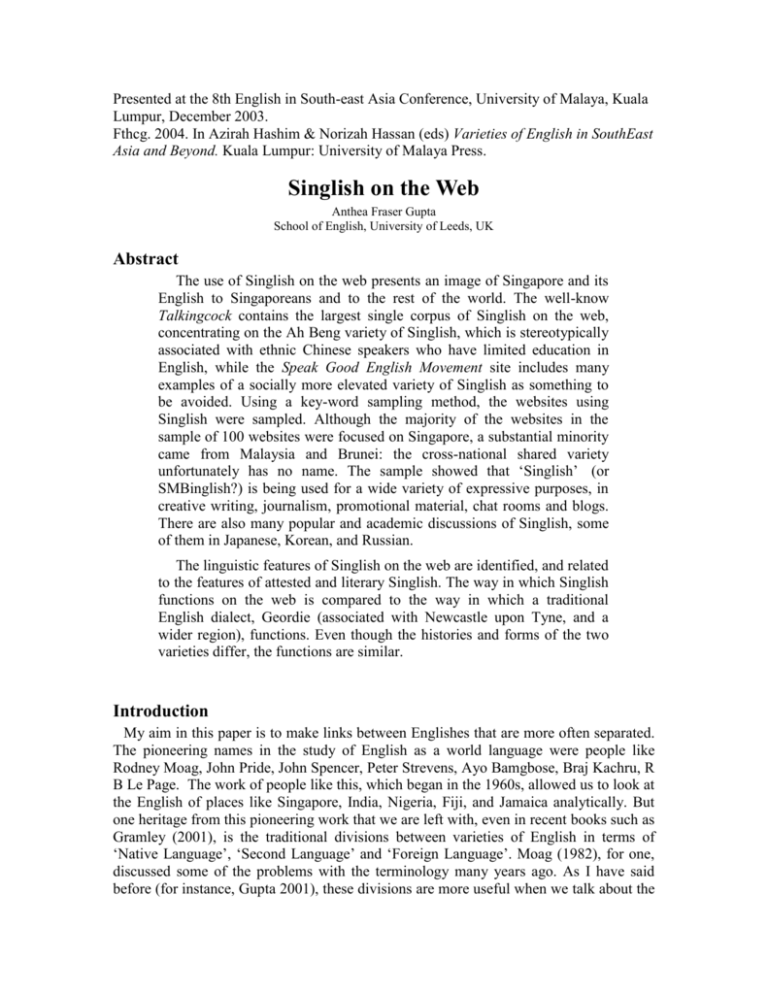
Presented at the 8th English in South-east Asia Conference, University of Malaya, Kuala Lumpur, December 2003. Fthcg. 2004. In Azirah Hashim & Norizah Hassan (eds) Varieties of English in SouthEast Asia and Beyond. Kuala Lumpur: University of Malaya Press. Singlish on the Web Anthea Fraser Gupta School of English, University of Leeds, UK Abstract The use of Singlish on the web presents an image of Singapore and its English to Singaporeans and to the rest of the world. The well-know Talkingcock contains the largest single corpus of Singlish on the web, concentrating on the Ah Beng variety of Singlish, which is stereotypically associated with ethnic Chinese speakers who have limited education in English, while the Speak Good English Movement site includes many examples of a socially more elevated variety of Singlish as something to be avoided. Using a key-word sampling method, the websites using Singlish were sampled. Although the majority of the websites in the sample of 100 websites were focused on Singapore, a substantial minority came from Malaysia and Brunei: the cross-national shared variety unfortunately has no name. The sample showed that ‘Singlish’ (or SMBinglish?) is being used for a wide variety of expressive purposes, in creative writing, journalism, promotional material, chat rooms and blogs. There are also many popular and academic discussions of Singlish, some of them in Japanese, Korean, and Russian. The linguistic features of Singlish on the web are identified, and related to the features of attested and literary Singlish. The way in which Singlish functions on the web is compared to the way in which a traditional English dialect, Geordie (associated with Newcastle upon Tyne, and a wider region), functions. Even though the histories and forms of the two varieties differ, the functions are similar. Introduction My aim in this paper is to make links between Englishes that are more often separated. The pioneering names in the study of English as a world language were people like Rodney Moag, John Pride, John Spencer, Peter Strevens, Ayo Bamgbose, Braj Kachru, R B Le Page. The work of people like this, which began in the 1960s, allowed us to look at the English of places like Singapore, India, Nigeria, Fiji, and Jamaica analytically. But one heritage from this pioneering work that we are left with, even in recent books such as Gramley (2001), is the traditional divisions between varieties of English in terms of ‘Native Language’, ‘Second Language’ and ‘Foreign Language’. Moag (1982), for one, discussed some of the problems with the terminology many years ago. As I have said before (for instance, Gupta 2001), these divisions are more useful when we talk about the GUPTA individual speaker or learner than they are when we talk about the collective. At a national level, it is not helpful to say that ‘English is a second language’ in (for example) Singapore. This blinds us to the reality that there are (numerous) individuals in Singapore for whom English is a native language and some for whom it is a foreign language (Kuiper & Kuiper 2003 discusses this for Malaysia). I am not going to engage with this concept in this paper, but instead will focus on how Singlish is used in the web, and how this is similar to the way English is used in a context that would traditionally be regarded as having a very different history. When I left Singapore in 1996 I was cut off from regularly hearing Singlish. I was not cut off from reading it, however. I enjoyed reading the satirical pieces in Talkingcock.com, often mocking the English of ‘Ah Bengs’ -- working class English speakers whose cultural and linguistic focus is on Chinese. I enjoyed the irony that the Speak Good English Movement’s website included dramatisation of the kind of Singlish used by middle class, highly educated speakers. Until I did the websearches for this paper, I did not understand just how rich was the use of Singlish on the web. We are just beginning to understand what the internet means in terms of world culture, and selfexpression. The presence of varieties of written English on the web is worthy of study. And one thing it teaches us is to draw similarities between different places. Before I move on to the comparison I make here, I would like to look briefly at 4 places where English is used: Scotland Jamaica Singapore Newcastle upon Tyne, England In all of these places, Standard English is the overwhelmingly dominant language of public discourse. And for me Standard English is unified -- the standard English used in all 5 places is the same except in trivial respects. Government websites are in Standard English. The newspapers published in these places are almost entirely in Standard English (and we can read them on the web). Even discussion rooms in which the citizens of these places chat are dominated by Standard English. For the entire English-using world Standard English is the language of education and literacy. But in all these places there is another named variety which is related to English, and which functions socially in some similar ways: Scotland: Scots Jamaica: Patwa (various spellings) Singapore: Singlish Newcastle: Geordie The order in which I have put them is meaningful. Because the first problem is whether the variety is a dialect of English or is a language separate from English. And here we can put Scots with Patwa, and Singlish with Geordie. In both Jamaica and Scotland, 2 GUPTA whether or not you see Scots and Patwa as separate languages from English or as dialects of English is highly politicised, with some people making strong claims for their being separate languages, and for having a place in education and formal writing, and official discourse. In the case of Singlish and Geordie, few argue for them being separate languages, and almost nobody sees any possibility of them being used in formal, educational and official spheres. Of these 4 varieties only Scots has official governmental recognition at national level. All 4 varieties function similarly in the community. They are used in speech in informal contexts, in the family, and among friends. All 4 varieties appear in similar contexts in the web: they are used in literature, in humour, they appear in glossaries and things about the variety. They also appear (but not a lot) in discussion groups. They function in an emblematic way (Douglas 2002 discusses how this works in Scottish newspapers) and as acts of identity (Le Page & Tabouret Keller 1985). Adapting Ferguson’s (1959) terminology, I will call them the L-varieties, as they are in some ways similar to the Low varieties of diglossia. Not everyone who lives in a given place uses the L variety in speech.. Some residents are incomers, foreigners and so on. In Newcastle (less so in the other three places) the use of the L variety is also linked to social class, with lower social classes being more likely to speak it in normal life. However, in all cases everyone has some access to the L-variety in its emblematic use, whether they speak it or not in their daily life, and that is what we are looking at here. These L-varieties are highly visible. Because all of us learn to read and write Standard English, a decision to write in anything other than Standard English is conscious. People do not drop into these varieties by mistake: they make an active decision to use them for emblematic reasons. As we will see, people from outside the community can also use the variety to characterise those who are from the place. In this paper I will focus on the two dialects of English: Singlish and Geordie. Where are these varieties used? One is centred on Singapore, and the other on the Tyneside conurbation in north-east England. The population size of Singapore is just over 3m (Leow 2001), and that of urban Tyneside around 1m (National Statistics Online 2003). Varieties don’t have sharp borders though. Around Tyneside is a wider region that shares many linguistic features. And around Singapore is an even wider region, covering the whole of Malaysia and Brunei, whose English shares many features with the English of Singapore. As we shall see, my methodology threw up sites which were not in Tyneside or in Singapore. Method We have not yet established reliable ways of doing random searches using web data, but there are ways in which systematic searches can be done. I inputted key words into the search engine, Google. Based on my knowledge of the varieties I chose two words that characterise the varieties, and which I thought highly likely to be used by anyone using the L variety emblematically1. Google generated websites that used both these words, and I looked at the first 100 of each variety. In some cases the website generated was not identical to the one in Google’s cache -- in this case I used the current website (in every case the variety was still used emblematically). I used cached versions only where the website was not available. 3 GUPTA This process of generating a sample was rather easier for Singlish than for Geordie. Singlish is much more visible than Geordie on the web. This is due to several reasons: the greater size of Singapore/Malaysia/Brunei; the extensive penetration of internet use in Singapore, especially among young people; more use of Singlish by Singaporeans, Malaysians and Bruneians than use of Geordie by residents of its region2. A search for +kiasu +lah generated more than enough hits (‘about 1030”). Although +canny +gannin gave “about 188” hits, Google recognised many of these as repeats, so I was able to use only 82 with these key words. I collected a further 16 from +“why aye” +hinny” and the remaining 2 from +”why aye” +canny. I read all 200 websites, in some cases without a great deal of pleasure, though I am glad to report that only one was pornographic. I had 17 false hits: 8 repeated sites not filtered by Google, 2 sites that included racing dogs in Australia called ‘Gannin yem’ ‘Canny fly’ (maybe these are relevant?), 2 deadlinks, 1 site that was in Glaswegian (where canny means something different), and 4 sites in highly colloquial Malay (sometimes mixed with some English). I classified them according to what the variety was doing. In most cases it was clear enough, though in one or two cases I decided on mixed genres, as in the case of a blog which uses the L-variety in the text, and also quotes a poem in it. In both varieties the issue of nomenclature and geography soon arose. It was surprisingly easy to identify where the sites were based, either physically or emotionally, and it soon became apparent that a substantial 18 of the ‘Singlish’ sites were people who identified themselves as Malaysian (2 of them were in Sarawak), 1 was Bruneian, and 1 was mixed Malaysian/Bruneian (students at British universities). As my methodology required the identification of a variety I felt I could not throw these sites away. But it is a little embarrassing. The similarities and differences between Singlish and colloquial Malaysian and Bruneian English are well-known. Tongue (1974) grouped them together and Platt & Weber (1980) made a partial separation. In recent years it has become more common to treat them separately, and work on Bruneian English has also begun. More work needs to be done on the dialectal features of English in this region. In writing, however, there is little difference. Unfortunately, there is no name for the L-variety across the region. Noone would use the expression ‘Singlish’ to talk about Colloquial Malaysian English or Bruneian English: indeed some of the sites were about ‘Malaysian English’. The majority of the sites were Singaporean, and certainly using this L variety as a marker of a national identity seems to be more salient in Singapore than in Malaysia or Brunei, so I will, if a little uncomfortably, continue to call it Singlish, in the absence of a better name, but we have to remember that 20% of these people were using what I call Singlish to express a non-Singaporean identity. The problems are similar, but a little less acute, in the case of Geordie. Some people use ‘Geordie’ to refer to the people and the variety of the city of Newcastle upon Tyne, which lies on the North Bank of the River Tyne. Others use it to refer to the urban area on both sides of the Tyne. Those within the region would not extend the term ‘Geordie’ to rural Northumberland or to the city of Sunderland, which is the next urban centre to the south (more or less joined on). But the lexical search threw up some sites which came from Sunderland, and one or two which made reference to rural Northumberland. These people 4 GUPTA would also not say they were using ‘Geordie’ -- the language activists who referred to rural Northumberland called it ‘Northumbrian’. What the L-variety does So what’s the same and what’s different about Singlish and Geordie? The uses of these two L varieties are much the same, with differences in proportion rather than type (Table 1). Types of use ‘Singlish’ ‘Geordie’ Chat/bulletin/blog 40 20 About the variety 25 18 Creative 16.5 45 Informational 12.5 6 N/A 6 11 Table 1: Singlish & Geordie websites: urls by category There are academic studies, material for students studying the varieties, glossaries for visitors, and joky glossaries for those in the know. You can learn about Singlish in Korean, Japanese, and Russian, and about Geordie in Norwegian and Indonesian (apparently Newcastle is twinned with Jakarta). For example: kiasu the fear of losing out. EG (In a bootfel Steam-boat Rest-torant) Ah Huat: "Why you so kiasu? Take so many. After can take again what" Ah Poh: "No lah, if don't take now, after no more already" <www.geocities.com/Tokyo/Towers/1156/singlish2.html> A Luv the toon, arlways heve arlways will. I'me a lifelong fan of Newcastle United Saya penggemar Newcastle United yang fanatik seumur hidup <www.geocities.com/Colosseum/Stadium/2577/geordie.htm> The rest of the categories are using the variety, not talking about it. A few of the texts are wholeheartedly in the variety, and in some cases are very sustained. Most have a lighter touch. Most websites use more standard spelling while a minority respell some or many words. One big difference in proportion arises from there being a lot of songs in Geordie, and few in Singlish. This difference accounts for the dominance of the creative category in Geordie. Many of these song websites are lists of titles, but others are lyrics, sometimes music too, and sometimes sound bites. There was only one hit on a song in Singlish. The reason for this is simply the longer history of Geordie. Most of the Geordie songs are nineteenth century music hall songs or traditional songs. This is a genre totally missing from Singlish, which is probably (Gupta 1994) only a century old. Many of these songs 5 GUPTA are from the nineteenth century music hall, and some are much earlier. The Geordie anthem, ‘The Blaydon Races’, appeared several times, in various versions: Oh! lads ye shud of seen us gannin', We pass'd the foaks along the road Just as they wor stannin'; Thor wes lots o' lads and lasses there, all wi' smiling faces, Gawn alang the Scotswood Road To see the Blaydon Races. Conrad Bladey's Beuk O' Newcassel Sangs < www.geocities.com/matalzi/geordiesang.html#races > The only Singlish song generated was the highly successful (and officially sponsored!) ‘Sar-vivor rap’. Here is part of it from a poster to the Temasek Junior College online forum: SARS is the virus that I just wanna minus No more surprises If you Use your brain Use your brain Use your brain" Some say "leh" Some say "lah" Uncle Phua says time to fight SARS Singaporeans we have a part to play To be SARS-free at the end of the day Wash your hands whenever you can Wash with soap then at least got hope When you get home take a bath quickly Be kiasu a bit Be safe not SAR-ry ... Hey if you kena home quarantine Don't go out except in your dreams Tahan a while and cooperate Don't give everybody a big headache <forums.tjc.edu.sg/topic.asp?ARCHIVE=true&TOPIC_ID=1346> In a way, any use of a Low variety is creative: it is hard to make a hard and fast rule what constututes a creative text, especially in journalism. Apart from the songs, the pattern of creative writing in Singlish and Geordie is similar. There is a good deal of satire, poems, journalism, some fiction, and even one pornographic text (female character’s dialogue in Geordie). Geordie and Singlish can be used for the entire work, or the speech of a particular character might be in Geordie or in Singlish. Interviewees are quoted in their (presumably) original Geordie and Singlish. Of all categories, satirical texts and humorous narratives are most likely to be in extreme Singlish or Geordie sustained at length, as in the next two examples. The Talkingcock text below is a pastiche of a newsgroup posting, and in a style characteristic of many of the texts in the Talkingcock website, while the Geordie text is a 6 GUPTA pastiche of the mini-biographies of public figures found in many newspapers and magazines. Malaysia always claim Singaproe as part of theirs.... Mahatir never forget that and tok a lot of cock on that waht... but har, he forgot that if he did not recognise that Singaproe is independent, he is also not recognising the authority of Malaysia.... I tot last time Malaysia sign an agreement with Singapore about our independence? Then the water hor, if they don't recognise the pact, might as well laugh at their own previous government who sign the pact! Funni leh, they also don't recognise their own thing, how you expect Singaporeans to recognise theirs? <www.talkingcock.com/html/article.php?sid=984> name Big Mickey C age 17 lives Killi hangout OOtside of morrys wears LaCoste Jacket, Rockports,Hi-Tec socks, Wrangler jeans,21 spider legs on me fringe. hobbies Gan oot with wor nikki,pillin off me tits, Afterdark, music happy hardcore,MC Siball,DJ Bennet, likes pills,hairspray,scroongin tabs, hates people looking at me (u lookin at me like?) drink yes please <www.newcastlestuff.com/downloads/December%202002.pdf> The most common use of Singlish or Geordie is as an act of personal identity. But the L varieties are also used by people who are outsiders to badge the identity of others.. A homesick woman returns from the US to India via Singapore and reports the speech of Singaporeans for the benefit of her fellow Indians, not getting it quite right: Sitting on the last leg of the flight I knew I was in home territory. Well, almost. Suddenly, I heard the unmistakable sound of English as we speak it -uh, kinda spoke like it like a few light years ago. Each light year is equivalent to one American month. I was leaving behind the land of Singlish (Singapore) with its "What lah, why you not coming to my home now, lah?" "Kisau what!" (kiasu means loser). <www.rediff.com/us/2000/aug/11us1.htm> Local websites in the English cities of Manchester and Derby poke fun at people from Newcastle. In this example a British squash player puts Geordie in the mouth of a Zambian who is based in Sunderland. According to the writer, this makes the Zambian ‘an honorary Geordie’. Like the Singlish example, this outsider perspective is not quite right: one of the things that is wrong is that within the north-east no-one calls people from 7 GUPTA Sunderland ‘Geordies’ (this would be like calling someone from Kuala Lumpur a Singaporean). However, Grapevine's spies in the North-East tell me that Ryding has drawn the short straw in the first round, coming up against honorary Geordie Ernest Chisenga, who made the short trip from Sunderland to Manchester today to join his Zambian team-mates saying "Why aye, bonny lad, that Ryding, he's got nay chance mind, canny lad 'n all like, but divvernt worry yerselves, Zambia's gannin' fer Gold ..." <www.squashplayer.co.uk/grapevine/grarchive-apr.htm> The Singapore government (Rubdy 2001) is in theory active in discouraging Singlish. In practice, it sometimes feels the need to promote it. Not only did official Singapore use Singlish in the ‘Sar-vivor rap’, but we also find a poem written in it in the Ministry of Education’s own brochure, Things that make us so Singaporean (NDP 2003): Singaporean? Aiyah, so easy... Go Kopitiam, can see already! See they go cut queue? We Singaporeans, so kiasu! Greedy one, never full! Eat rojak, want yong-tau-foo! Oi, what you laughing about??!! - Loh Huilin, student 14 <www.nexus.gov.sg/resources/NDP03book.pdf> In the informational category, net users are advised not to use Geordie on international websites, while Singaporeans are warned that their English might be incomprehensible to foreigners too: In Singapore, there is a local brand of English called Singlish, or Singapore English, which is enriched with words coined from the other widely spoken languages and dialects in the nation, including Mandarin, Hokkien, Malay and Tamil. "Don’t be so kiasu lah!", "Ok lor!" and "You got meh?" are common Singlish phrases that would be totally incomprehensible to foreigners. The right places to start listening in English include radio programs, television programs and movies made in countries such as the United Kingdom, the United States of America and Australia. As you listen to these programs, try to learn how English is spoken in those countries. Pay special attention to their grammar, choice of words and sentence construction. Ignore their accents if you can, as they are only applicable to their specific countries and you risk being isolated if you speak like them in your own country. <www.sgbox.com/studyskill3.html> Read what you've written 8 GUPTA Then put yourself in the place of someone who doesn't know what you're doing and read it again from that perspective. Bear in mind also that newsgroups are international so not everyone may know what you mean. For example: "It was gannin canny like before a knackered it" - "It (the script) was running perfectly well before I modified it". Also references to things that mean different things in different languages e.g. "football" (America vs Rest of World) and "cheap drink" (Western Europe vs Scandinavia). <www.andrewu.co.uk/clj.asp> Incidentally, this Geordie writer, Andrew Urquhart, is from Bath, but his masters degree from Newcastle seems to be the driver of his choice of Geordie for this example. If you are reporting on a running or cycling race, you might use a little Singlish (even if you are an expat living in Singapore), while in a review of a concert a few words of Geordie can similarly be inserted. Someone keeping the minutes of Parish Council meetings puts one of his arguments in Geordie (and prefaces it with a note indicating that some people have objected to his Geordie sections). In Singapore you can even buy Singlish pager messages, while back in the UK we have the Northumbrian Language Society, who use Geordie to announce the happy news that fund raising has been successful. This yeor is ganna be varry important fer wor society. When wu look back, aah reckon wu’ll see hoo much progrees wu’ve med. an why div aah say thet? it’s deed simple - the moody byuk. wu’ve taaked aboot it fer yeors, an hoped thet summat’d torn up ti let wu dee it. An be summat, aah mean the munny ti let wu get it printed. wu think wu’ve fund the munny, and wuh keepin wor fingers crossed thet it’ll aal cum oot reet this time, an thet it’s ganna be reddy fer wor speshul meetin on 11th october in morpeth toon haal.. wu’ll keep yu posted on wot’s gannin on, an aah hope yu’ll be theor ti support wu. <www.northumbriana.org.uk/langsoc/events.htm> In tourist information small amounts of Geordie and Singlish are used, presumably to give would-be visitors a taste of local colour. Shiok. Sedap. Delicious. Three words that connote lip-smacking good stuff. <www.thingsasian.com/goto_article/article.1419.html> Whether you're gannin by plane, train, automobile, charabanc or shuggyboat here are some links to places to visit and things to do. <gazzalw.tripod.com/travel.html> Finally, we come to the uses that are most like speech. These are the various chatrooms, bulletin boards, and blogs. We don’t always have much information about the posters (who may also not tell the truth), but they seem to be predominantly in their 9 GUPTA teens and twenties. For Geordie I hit on 5 blogs, compared to 27 for Singlish. But, as we will see, what is going on in these blogs is the same. Many texts in this category use sensational spellings (gimme, gotta), and some use SMS abbreviations. The majority of texts use only non-regionalised spellings, either standard, or internationally used in specific genres English. These do not add regionalisation. The texts which are highly focused on Geordie may respell almost every word. The Singlish users tend to be in chat rooms with many other Singlish users, while the Geordie-users are likely to be in more mixed rooms. So the Singlish users have a collective identity, while the Geordie users are typically expressing an identity with some of the others in the room, in contrast with non-Geordies. Geordie users appear to be interested in music, alcohol, football, sex, and travel (sometimes in combination). One bulletin board which included posters with very focused Geordie was about holiday flats in Corfu (this combined several of the interests). Singlish users have wider interests, including fish (arrowana and koi), dogs, motorbikes, sex, and travel. The L variety in all cases is principally used to express their own identity (“This is me -- I am from this place and proud of it!”). The content can be supportive of others or can be extremely insulting. There is a great deal that insulting to other groups, typically ones close by. Geordie users from Newcastle are rude about people from the two towns just to the south, Sunderland and Middlesbrough, and people from Sunderland are rude about people from Newcastle. Malaysians and Singaporeans are rude about each other, and, on one occasion, to each other. Because one of my words was ‘kiasu’, which is a Singaporean national stereotype, I hit on some discussions about whether Malaysians are ever kiasu, or only Singaporeans, and another about whether only the Chinese are kiasu. The chat mixes the L variety and Standard English. There’s going to be a dog show in Kuala Lumpur, but some people in this group are in East Malaysia. Most of the discussion has been in Standard English3: Adrian: Alamak... Teruk-lah us is Sarawak... Cannot Show/Participate.... So many show again .... This one like only can see but cannot eat... Teruk-lah -Sigh- Whimper- -SighSo unfair one-lah.... Derrickok: If can see, can eat, can touch and also can join in have fun. Where is this concept of Shiseido? You want the cake and makan as well? Mohamad goes to the mountain, Mountain don't come to Mohamad. But of course Faith can always move mountain as the Late Nat King Cole used to sing. Adrian: Aiyo Sifu... The point is you all can makan... not us in Sarawak-bah....we only can see and salivate mah.... But if there is a will sure got way eh? Now where is that private email you wanted to send me for some joint kennel management? 10 GUPTA <www.puppy.com.my/forum/Announcement_C2/Event_Calendar_F21/SHOW_CA LENDAR_FOR_2002_P2064> In the following chat extract, ‘Just a punk’ has seen that one of the participants, ‘Lesbygurl’, has indicated in her details that ‘she’ is from ‘Newcastle... aka geordieland... aka...the greatest city, ever!’. Just a punk: hello a fellow geordie, our population is about 5 now on here i think hows it going? or should i say..... "hows it gannin like?" Lesbygurl: Aye canny. gannin doon the toon the nite like? lol!!! We geordies shall rule the earth one day, just you wait, then our population on here will be MILLIONS!!! Mwahhahah! LoL! How ya dee'in yursel? Just a punk: well im aal reet gannin t get sum pizza soon for sumnthin to eat like thats aboot nuw actually <www.stereoboard.com/viewtopic-36535.html> Blogs Of all the texts, the blogs are the most fascinating. I decided to use a sample of the blogs for some more detailed linguistic analysis. I was not too strict about the definition of ‘blog’: I have used the term for any kind of online diary. Some were classical blogs with logs of the poster’s reading and website use, and comments from others. Others were more like personal diaries with emotional support in the comments of others. Others were more like personal web pages without any opportunity for others to comment. I did not think that the finer points of genre definition mattered much for what I am doing. In my sample, there were 5 blogs (so defined) that used Geordie, and 27 that used Singlish. The sample I used for closer analysis consists of the 5 Geordie blog pages on which I got hits and numbers 1, 6, 11, 16, and 21 of the Singlish blogs. Some of these blogs are complex texts: I used only the body of the text, and did not include any comments. I identified features of lexis, syntax and orthography I knew to be indicative of the L ‘Singlish’ blogs ‘Geordie’ blogs S1 S2 S3 S4 S5 G1 G2 G3 G4 G5 3 28 4 4 11 17 0* 1 19 97 Table 2: Percentage of words in sentences with L-variety feature(s) variety and calculated how many words were in sentences that included some Lcoloration. Apart from one of the Geordie texts, the answer is, not many (Table 2). The dominant mode is light touch regionalization. 11 GUPTA This more systematic survey allows us to say something about what is going on linguistically. The L variety is signalled mostly through lexis, and mostly through a small number of lexical items which appear repeatedly. These were the words used in more than one of the sampled blogs: Singlish: Geordie: lah, man, hor, / kiasu (3 discourse markers, 1 adjective) hinny, man, pet, why-aye, / canny, / dog, lad, mackem, mam, nappa, / gan, hoy (4 discourse markers, 1 adjective, 5 nouns, 2 verbs) Obviously my search words will appear in every text because of the methodology, but I chose them because I knew they were key words anyway. It is interesting to note that in these written texts the most common discourse particle is lah: in real spoken texts it is ah (Gupta 1991, 1994, Low & Deterding 2003), which is rather rare in written Singlish. The dominance of discourse markers in both L varieties is interesting. Matras (1998:282) argues that discourse markers are one of the most likely items to be used crosslinguistically. The circumstances he discusses are very different from these, but their prominence is worth noting. All the texts except G5 are dominated by internationalised English in every way. Most of them use Standard English, though some of the blogs are influenced by the spelling norms of SMS and chat. Many blogs from all over the world use extreme respelling -- it was easier to find these in the US and Singapore than in the UK, but certainly SMS style is a popular style for blogs. Here are examples of respelling that were not in my 200 websites: 2dae: whoo~ slept ad 12+am worx.. sho earli.. hohox.. damn tired okeas.. h0h0x.. den actualli wana go use com ad 1+ de.. budden sho tired.. sho dowan norx.. gee.. go back slp.. 2dae 7+ wake up niaox.. wana go back slp budden cannot so nua ad bed.. see hp.. see got dear miss cor marx.. budden dun hab.. den go wash up niaox.. hohox.. go net.. cuz mua blog gort prob.. (Singapore)<fi0namui.blogdrive.com> m8s WAHEY!!! corse, that was before that 'fatal' day at the park. All i was doin was sleeping against the tree, waiting 4 my best m8s 2 turn up. When he rode over with a guy i knew from school. First thoughts: 'wow. definatly on my "phwoar" list! Gotta try n get him!' (UK) <216.239.59.104/search?q=cache:zYjD1KkAe0J:www.20six.co.uk/69unique69+%2B2day+%2Bsez+%2Buk&hl=en &ie=UTF-8> This kind of respelling links the posters with a community of young people across the world and is like Standard English in its internationalism. The choice to spell in this way is every bit as deliberate as the choice to use the L variety. But it represents a different 12 GUPTA kind on non-standard English, and an emblematically different act of identity. There was some respelling, especially in the Geordie texts, which was suggestive of the L variety: Singlish: (Hardly any.) Someting. Geordie: Toon, broon (esp. football team & local beer). Knaa, aal. Dorty. Wor. Ye. Neet. Lang. Hyem. Wi (for ‘we’). Divven’t. Worra, gorra. Nae (esp. in ‘Nae bother, man’). –in/-in’. Cannot/cannit (not ‘can’t’). One of the Geordie texts and 4 of the Singlish texts show some use of grammatical features characteristic of the variety, though in all cases Standard English grammar dominates. When we examine the grammatical features of the two L varieties we see how Geordie is a traditional dialect and Singlish is a contact variety -- in the form -- most of the Geordie features concern differences in inflectional morphology. Two of the features I identified as grammatically characteristic of Singlish, BE-deletion and PRO-drop, are also characteristic of the abbreviated kind of writing used in SMS messages and diaries, both of which are stylistic influences in blogs. They go back a long way. Singlish Conditionals without subordinator, invariant ‘is it’ tag, base form of verb in 3 ps sg present tense Geordie Possessive pronouns me and we. Subject pronoun thee. Relativiser what. Demonstrative them. Preterite sung The dominant pattern in all my texts is the one seen in the following examples -- a small number of key lexical items and formulaic expressions are used to give a flavour of thevariety. They are especially used in comment. also lost the match to 2/7 in basketball..we played hard.. fought hard..and well hiax wat to say...they play so rough lah... next moment..meaing next year in sec 3 lolz....hear some pple retained...well all inoe it's gonna be free from someone at least... (Sblog1) <www.evanscence6789.blogspot.com> As some of you will know Tom missed the game because he was at a Jewish wedding in London. At least he took one on those mini telly things with him so he could tune in to the game during the reception. I tried to wind him up by sending him a text saying that the Dog was only 79 pence in Wetherspoons. He didn't bite at all. His reply was "The beer's free here, but I wish I was at the match though." Canny lad! (Gblog4)<www.malcolmclark.plus.com/ym/home_previous.html> 13 GUPTA The 5 Geordie blogs were all by older people (the youngest was 32), while the Singlish blogs were a younger group, the majority of them school students. Although the 5 Singlish texts I selected for closer analysis did not include one that used extreme respelling, such texts were included in the 27. Some of these blogs have a linguistic vitality and playfulness that is astounding. My sampling method suggests that young bloggers in the UK are less likely to use their regional variety as part of their linguistic playfulness, but obviously that’s something that needs more evidence. The following two examples were not in the smaller sample, but were among the sample of 200: its damn sian lorh... i've posted "many" msgs todae lorh.... veri sad de... bcos hor... mi n mr tan todae din even chat loh... :'( :'( :'( sad till wanna cry liao.... now deleting "many" things in my inbox.... especially those msgs runxuan sent 1... crush on him over liao... might as well delete lor.... save space for my inbox.... hahaha... dun think i'll be able to check inbox in around 1 week plus to 2 weeks... starting from monday... <ailing87.blogspot.com/2003_03_30_ailing87_archive.html> Tuesday, August 19, 2003 im done wiv my hari raya kurung for diz yr. hhmmm..... ok ok i noe dat its kinda early, ramadhan is abt 2 mths away but then agn, im not takin any chances this time round after wad i experienced on the previous one. the shop dat i sent for tailoring rejected me coz i was way too late as he had tons of tailored kurung to finish. so there goes my kain..... i was adviced to get it tailored earlier and i guessed, i took his advice well. i am not being the kiasu singaporean but like ive said, im not goin to take any chances after all the effort i put in gettin the kain at kampung jawa over the weekend wiv nat!! im always known to be the cerewet guy (u can confirm dat wiv her...hehehe) and suprisingly, i managed to get the kain in half an hr. i was actually contemplating between 2 of the many kains in the store of the same fabric but after some posed on the mirror wiv the kain and much to nat's liking, i decided on my selection and done!! very contented wiv it and im hopin dat it wud turn out nice..... <xircuff13.blogspot.com/2003_08_01_xircuff13_archive.html> Conclusion Apart from the absence of songs from Singlish, Geordie and Singlish are similar in terms of function and use. Their users are creative, and are free in their use -- there is no single norm here, but a range of choices for users. Anyone who writes in a non-standard English has made an active decision to do so. They do it principally to express an act of identity (Le Page & Tabouret Keller 1985). On the web your accent can’t be heard, and your face can’t be seen (your avatar might be a dalmatian or a guppy), so you seek to express your selfhood in some other way. One way that you can express your identity is by using words, and occasionally grammar and orthography, associated with a regional L 14 GUPTA variety. Singlish and Geordie both function as regionally marked L varieties. These are publicly available signifiers -- outsiders can also use them to characterise a group. The fact that Singlish is a contact variety that emerged from a complex multilingual setting in which the first generation of speakers were native speakers of other languages, while Geordie is a traditional English dialect developed by generations of native speakers is relevant to the form, but not to the function of these varieties. Using S(MB)inglish in this way is a sign of the vitality of English in Singapore, Malaysia and Brunei. Places where English is not your own language do not use it in this way! Using Singlish links SMB with a wider world of English speakers, rather than isolating them. Many English speakers have access to a variety that they can knowingly use in contrast to Standard English or to other international varieties. References 1GlobalPlace. <www.1globalplace.com/> Douglas, Fiona M. 2002. The role of Scots lexis in Scottish newspapers. Scottish Language 21, 1-12. Ferguson, Charles. 1959. Diglossia. Word 15, 325-340. Google. <www.google.com>[accessed November 2003] Gramley, Stephan. 2001. The vocabulary of World English. London:Arnold. Gupta, Anthea Fraser. 1992. The Pragmatic Particles of Singapore Colloquial English. Journal of Pragmatics 17:3, 39-65. Gupta, Anthea Fraser. 1994. The Step-Tongue: Children's English in Singapore. Clevedon: Multilingual Matters. Gupta, Anthea Fraser. 2001. Realism and imagination in the teaching of English. World Englishes 20:3: 365-381. Kuiper, Alison & Koenraad Kuiper. 2003. Constructing vocational aspirations linguistically. Globalisation, Societies and Education 1:2, 223-240. Le Page, R B & Andrée Tabouret-Keller. 1985. Acts of identity: creole-based approaches to language and ethnicity. Cambridge: CUP. Leow Bee Geok. 2001. Census of population 2000. Statistical Release 1: Demographic characteristics. Singapore: Singapore Department of Statistics. Low Ee Ling & David Deterding. 2003. A corpus-based description of particles in spoken Singapore English. In David Deterding, Low Ee Ling & Adam Brown (eds). English in Singapore: Research on grammar. Singapore: McGraw Hill, 58-66. Matras, Yaron. 1998. Utterance modifiers and universals of grammatical borrowing. Linguistics 36:2, 281-331. Moag, Rodney. 1982. English as a foreign, second, native and basal language: a new taxonomy of English- using societies. In John B Pride (ed.), New Englishes. Rowley, Mass.: Newbury House, 11-50. 15 GUPTA National Statistics Online. 2003. Census 2001. Statistics website: <www.statistics.gov.uk>. Crown copyright material is reproduced with the permission of the Controller of HMSO. [accessed November 2003] NDP 2003 Executive Committee. 2003. Things that make is Singaporean. Singapore: NDP 2003 Executive Committee.[access from <http://www.nexus.gov.sg/>] Platt, John & Heidi Weber. 1980. English in Singapore and Malaysia. Kuala Lumpur: OUP. Rubdy, Rani. 2001. Creative destruction: Singapore’s Speak Good English movement. World Englishes 20:3, 341-355. Simpson, David A. 2001. Geordie Dictionary. Northeast England History Pages. <www.thenortheast.fsnet.co.uk/GeordieDictionary.htm> [accessed November 2003] The Coxford Singlish Dictionary. Talkingcock.com <www.talkingcock.com/> [accessed November 2003] Tongue, R K. 1974. The English of Singapore And Malaysia. 2nd. edn. Singapore: Eastern Universities Press. [also 2nd edn., 1979] 1 2 3 Use of the online dictionaries will help readers to understand the lexical items of these varieties. I recommend ‘The Coxford Singlish Dictionary’ and Simpson’s ‘Geordie Dictionary’. Estimating internet penetration is problematical. Using similar data, 1GlobalPlace quotes the Gartner group estimate that Internet penetration in UK would be 64% in UK in 2003, and would be 51% in Singapore, which isn not much different In all of these extracts, the layout has been adapted, so that personal information, routeing information, avatar images, and sigs are omitted. 16
